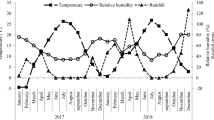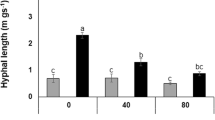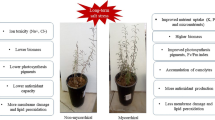Abstract
Alfalfa is the most forage crop cultivated in Mediteranean area where salinity is one of the main limiting factors for its production. Thus, a consortium of arbuscular mycorrhizal fungi (AM) isolated from the Aoufous palmeraie, Morocco, and autochthonous rhizobia strain (RhLO1) or their combination (AM + RhLO1) were tested for their efficiency to improve alfalfa tolerance to salinity. The grass waste compost was given as a source of organic matter to the soil. Antioxidant status, physiological parameters and growth of alfalfa were evaluated. The results showed that the highest alfalfa growth was reached in plants dually inoculated particularly under non-stress conditions. Dual inoculation also enhanced the stomatal conductance in control plants, while the nodule number and mycorrhizal infection were enhanced under both conditions. Salt stress did not affect the efficiency of photosystem II. However, single or dual inoculation increased this efficiency. RhLO1 or AM + RhLO1 symbiosis could alleviate the deleterious effects of salinity on alfalfa. They could maintain higher leaf water potential (LWP Ψ), reducing the electrolyte leakages and malondialdehyde (MDA) content, inducing the accumulation of compatible osmolytes (sugar) and antioxidant enzymes as defense strategy. Thus, these autochthonous microorganisms were effective for alfalfa plants to alleviate salinity damage and improve plant growth and productivity.
Zusammenfassung
Alfalfa ist die meistverwendete Futterpflanze im Mittelmeerraum, wo der Salzgehalt einer der wichtigsten limitierenden Faktoren für seine Produktion ist. In dieser Studie wurden arbuskuläre Mykorrhizapilze (AM), die aus dem Stamm Aoufous palmeraie, Marokko, isoliert wurden, und autochthone Rhizobien (RhLO1) oder deren Kombination (AM + RhLO1) auf ihre Effizienz getestet, die Salztoleranz von Alfalfa zu verbessern. Der Grasabfallkompost wurde als Quelle für organische Stoffe in den Boden eingebracht. Der antioxidative Status, die physiologischen Parameter und das Wachstum von Alfalfa wurden untersucht. Die Ergebnisse zeigten, dass das größte Alfalfa-Wachstum bei Pflanzen erreicht wurde, die insbesondere unter stressfreien Bedingungen doppelt beimpft wurden. Die doppelte Beimpfung erhöhte auch die stomatäre Leitfähigkeit in Kontrollpflanzen, während die Knöllchenzahl und die Mykorrhiza-Infektion unter beiden Bedingungen erhöht wurden. Der Salzstress hatte keinen Einfluss auf die Effizienz des Photosystems II. Die ein- oder zweifache Beimpfung erhöhte jedoch die Effizienz. Die RhLO1- oder AM + RhLO1-Symbiose könnte die schädlichen Auswirkungen des Salzstresses auf Alfalfa lindern. Sie könnten ein höheres Blattwasserpotenzial aufrechterhalten (LWP Ψ), die Elektrolytverluste und den Gehalt an Malondialdehyd (MDA) reduzieren und die Ansammlung geeigneter Osmolyten (Zucker) und antioxidativer Enzyme als Abwehrstrategie induzieren. Somit waren diese autochthonen Mikroorganismen für Alfalfa-Pflanzen wirksam, um Salzschäden zu lindern und das Pflanzenwachstum und die Produktivität zu verbessern.








Similar content being viewed by others
References
Abd-Alla MH, El-Enany A‑WE, Nafady NA et al (2014) Synergistic interaction of Rhizobium leguminosarum bv. viciae and arbuscular mycorrhizal fungi as a plant growth promoting biofertilizers for faba bean (Vicia faba L.) in alkaline soil. Microbiol Res 169:49–58. https://doi.org/10.1016/j.micres.2013.07.007
Arnon D (1949) Copper enzymes in isolated chloroplasts. Polyphenoloxidase in beta vulgaris. Plant Physiol 24:1–15
Ashraf M, Harris PJC (2013) Photosynthesis under stressful environments: An overview. Photosynthetica 51:163–190. https://doi.org/10.1007/s11099-013-0021-6
Ashraf M, Shahbaz M, Ali Q (2013) Drought-induced modulation in growth and mineral nutrients in Canola ( brassica Napus L .). Pak J Bot 45:93–98
Augé RM (2000) Stomatal behavior of arbuscular mycorrhizal plants. In: Kapulnik Y, Douds DD (eds) Arbuscular mycorrhizas: physiology and function. Kluwer, Dordrecht, pp. 201–237
Bano A, Fatima M (2009) Salt tolerance in Zea mays (L). following inoculation with Rhizobium and Pseudomonas. Biol Fertil Soils 45:405–413. https://doi.org/10.1007/s00374-008-0344-9
Bertrand A, Dhont C, Bipfubusa M et al (2015) Improving salt stress responses of the symbiosis in alfalfa using salt-tolerant cultivar and rhizobial strain. Appl Soil Ecol 87:108–117. https://doi.org/10.1016/j.apsoil.2014.11.008
Beyer W, Fridovich I (1987) Assaying for Superoxide Dismutase activity : Some large consequences of minor changes in conditions. Anal Biochem 566:559–566
Biró B, Köves-Péchy K, Vörös I et al (2000) Interrelations between Azospirillum and Rhizobium nitrogen-fixers and arbuscular mycorrhizal fungi in the rhizosphere of alfalfa in sterile, AMF-free or normal soil conditions. Appl Soil Ecol 15:159–168. https://doi.org/10.1016/S0929-1393(00)00092-5
Blaylock MJ, James BR (1994) Redox transformation and plant uptake of Se resulting from root-soil interactions. Plant Soil 158:1–17
Elboutahiri N, Thami-Alami I, Udupa SM (2010) Phenotypic and genetic diversity in Sinorhizobium meliloti and S. medicae from drought and salt affected regions of Morocco. Bmc Microbiol 10. https://doi.org/10.1186/1471-2180-10-15
Farissi M, Bouizgaren A, Faghire M et al (2011) Agro-physiological responses of Moroccan alfalfa ( Medicago sativa L .) populations to salt stress during germination and early seedling stages. Seed Sci Technol 39:389–401
Farissi M, Bouizgaren A, Faghire M et al (2013) Agrophysiological and biochemical properties associated with adaptation of Medicago sativa populations to water deficit. Turk J Botany 37:1166–1175. https://doi.org/10.3906/bot-1211-16
Flajoulot S, Ronfort J, Baudouin P et al (2005) Genetic diversity among alfalfa (Medicago sativa) cultivars coming from a breeding program, using SSR markers. Theor Appl Genet 111:1420–1429. https://doi.org/10.1007/s00122-005-0074-4
Frey-Klett P, Garbaye J, Tarkka M (2007) The mycorrhiza helper bacteria revisited. New Phytol 176:22–36. https://doi.org/10.1111/j.1469-8137.2007.02191.x
Gage DJ (2004) Infection and invasion of roots by symbiotic, nitrogen-fixing rhizobia during nodulation of temperate legumes. Microbiol Mol Biol Rev 68:280–300. https://doi.org/10.1128/MMBR.68.2.280-300.2004
Gryndler M (2000) Interactions of arbuscular mycorrhizal fungi with other soil organisms. Arbuscular mycorrhizas: Physiology and function. Springer, Dordrecht, pp 239–262
Gupta B, Huang B (2014) Mechanism of salinity tolerance in Plants: physiological, biochemical, and molecular characterization. Int J Genomics 2014:701596. https://doi.org/10.1155/2014/701596
Hasegawa PM, Bressan RA (2000) Plant cellular andmolecular responses tohigh salinity. Annu Rev Plant Physiol Plant Mol Biol 51:463–499
He ZQ, He CX, Zhang Z Bin, et al (2007) Changes of antioxidative enzymes and cell membrane osmosis in tomato colonized by arbuscular mycorrhizae under NaCl stress. Colloids Surf B Biointerfaces 59:128–133. https://doi.org/10.1016/j.colsurfb.2007.04.023
Hori K, Wada A, Shibuta T (1997) Changes in Phenoloxidase activities of the galls on leaves of Ulmus davidana formed by Tetraneura fusiformis ( Homoptera: Eriosomatidae). Appl Entomol Zool (Jpn) 32(2):365–371. https://doi.org/10.1248/cpb.37.3229
Juniper S, Abbott LK (2006) Soil salinity delays germination and limits growth of hyphae from propagules of arbuscular mycorrhizal fungi. Mycorrhiza 16:371–379. https://doi.org/10.1007/s00572-006-0046-9
Lutts S, Kinet JM, Bouharmont J (1996) Nacl-induced senescence in leaves of rice (Oryza sativa L.) Cultivars differing in salinity resistance. Ann Bot 78:389–398. https://doi.org/10.1006/anbo.1996.0134
Madhava Rao KV, Sresty TVS (2000) Antioxidative parameters in the seedlings of pigeonpea (Cajanus cajan (L.) Millspaugh) in response to Zn and Ni stresses. Plant Sci 157:113–128. https://doi.org/10.1016/S0168-9452(00)00273-9
Marulanda A, Barea JM, Azcón R (2009) Stimulation of plant growth and drought tolerance by native microorganisms (AM fungi and bacteria) from dry environments mechanisms related to bacterial effectiveness. J Plant Growth Regul 28:115–124
Meddich A, Jaiti F, Bourzik W et al (2015) Use of mycorrhizal fungi as a strategy for improving the drought tolerance in date palm (Phoenix dactylifera). Sci Hortic 192:468–474. https://doi.org/10.1016/j.scienta.2015.06.024
Meddich A, Oihabi A, Abbas Y, Bizid E (2000) Rôle des champignons mycorhiziens à arbuscules de zones arides dans la résistance du trèfle (Trifolium alexandrinum L.) au déficit hydrique. Agronomie 20:283–295. https://doi.org/10.1051/agro:2000127
Mortimer PE, Pérez-Fernández MA, Valentine AJ (2012) Arbuscular mycorrhiza maintains nodule function during external NH 4+supply in Phaseolus vulgaris (L.). Mycorrhiza 22:237–245. https://doi.org/10.1007/s00572-011-0396-9
Munns R (2002) Comparative physiology of salt and water stress. Plant Cell Environ 25:239–250. https://doi.org/10.1046/j.0016-8025.2001.00808.x
Nawaz K, Hussain K, Majeed A et al (2010) Fatality of salt stress to plants: Morphological, physiological and biochemical aspects. Afr J Biotechnol 9:5475–5480. https://doi.org/10.5897/AJB10.100
Noctor G, Foyer CH (1998) Ascorbate and glutathione: Keeping active oxygen under control. Annu Rev Plant Physiol Plant Mol Biol 49:249–279. https://doi.org/10.1146/annurev.arplant.49.1.249
Phillips JM, Hayman DS (1970) Improved procedures for clearing roots and staining parasitic and vesicular-arbuscular mycorrhizal fungi for rapid assessment of infection. Trans Br Mycol Soc 55:158. https://doi.org/10.1016/S0007-1536(70)80110-3
Porcel R, Aroca R, Ruiz-Lozano JM (2012) Salinity stress alleviation using arbuscular mycorrhizal fungi. A review. Agron Sustain Dev 32(1):181–200. https://doi.org/10.1007/s13593-011-0029-x
Porcel R, Barea JM, Ruiz-Lozano JM (2003) Antioxidant activities in mycorrhizal soybean plants under drought stress and their possible relationship to the process of nodule senescence. New Phytol 157:135–143. https://doi.org/10.1046/j.1469-8137.2003.00658.x
Smith JHC, Benitez A (1955) Chlorophylls: Analysis in plant materials. In: Paech K, Tracey MV (eds) Modern methods of plant analysis, vol 4. Springer, Berlin, Heidelberg, pp 142–196 https://doi.org/10.1007/978-3-642-64961-5_6. ISBN 978-3-642-64963-9
Takamiya K, Tsuchiya T, Ohta H (2000) Degradation pathway (s) of chlorophyll: what has gene cloning revealed? Trends Plant Sci 5:426–431
Tejera García NA, Olivera M, Iribarne C, Lluch C (2004) Partial purification and characterization of a non-specific acid phosphatase in leaves and root nodules of Phaseolus vulgaris. Plant Physiol Biochem 42:585–591. https://doi.org/10.1016/j.plaphy.2004.04.004
Trouvelot A, Kough JL, Gianinazzi-Pearson V (1986) Mesure du taux de mycorhization VA d’un système radiculaire. Recherche de méthodes d’estimation ayant une signification fonctionnelle. In: Gianinazzi-Pearson V, Gianinazzi S (eds) Physiological and genetical aspects of mycorrhizae. INRA, Paris, pp 217–221
Vimal SR, Singh JS, Arora NK, Singh S (2017) Soil-plant-microbe interactions in stressed agriculture management: A review. Pedosphere 27:177–192. https://doi.org/10.1016/S1002-0160(17)60309-6
Vivas A, Marulanda A, Ruiz-Lozano JM et al (2003) Influence of a Bacillus sp. on physiological activities of two arbuscular mycorrhizal fungi and on plant responses to PEG-induced drought stress. Mycorrhiza 13:249–256. https://doi.org/10.1007/s00572-003-0223-z
Wang W, Vinocur B, Altman A (2003) Plant responses to drought, salinity and extreme temperatures: Towards genetic engineering for stress tolerance. Planta 218:1–14. https://doi.org/10.1007/s00425-003-1105-5
Wu Q‑S, Xia R‑X (2006) Arbuscular mycorrhizal fungi influence growth, osmotic adjustment and photosynthesis of citrus under well-watered and water stress conditions. J Plant Physiol 163:417–425. https://doi.org/10.1016/j.jplph.2005.04.024
Xu L, Yan D, Ren X, et al (2016) Vermicompost improves the physiological and biochemical responses of blessed thistle (Silybum marianum Gaertn.) and peppermint (Mentha haplocalyx Briq) to salinity stress. Ind Crops Prod 94:574–585. https://doi.org/10.1016/j.indcrop.2016.09.023
Yamaguchi T, Blumwald E (2005) Developing salt-tolerant crop plants: Challenges and opportunities. Trends Plant Sci 10(12):1360–1385. https://doi.org/10.1016/j.tplants.2005.10.002
Zhang HS, Qin FF, Qin P, Pan SM (2014) Evidence that arbuscular mycorrhizal and phosphate-solubilizing fungi alleviate NaCl stress in the halophyte Kosteletzkya virginica: Nutrient uptake and ion distribution within root tissues. Mycorrhiza 24:383–395. https://doi.org/10.1007/s00572-013-0546-3
Zhang SA, Hu JA, Zhang YA et al (2007) Seed priming with brassinolide improves lucerne ( Medicago sativa L .) seed germination and seedling growth in relation to physiological changes under salinity stress. Aust J Agric Res 58(8):811–815. https://doi.org/10.1071/ar06253
Acknowledgements
The authors are thankful to Dr. Thouria Bourhim, Faculty of Sciences Semlalia, Cadi Ayyad University, for her critical reading, valuable suggestions and corrections during writing this article.
Funding
This work was funded by the Ministère marocain de l’Enseignement Supérieur, de la Recherche Scientifique et de la Formation des Cadres, Morocco.
Author information
Authors and Affiliations
Corresponding authors
Ethics declarations
Conflict of interest
R. Ben Laouane, A. Meddich, N. Bechtaoui, K. Oufdou and S. Wahbi declare that they have no competing interests.
Rights and permissions
About this article
Cite this article
Ben Laouane, R., Meddich, A., Bechtaoui, N. et al. Effects of Arbuscular Mycorrhizal Fungi and Rhizobia Symbiosis on the Tolerance of Medicago Sativa to Salt Stress. Gesunde Pflanzen 71, 135–146 (2019). https://doi.org/10.1007/s10343-019-00461-x
Received:
Accepted:
Published:
Issue Date:
DOI: https://doi.org/10.1007/s10343-019-00461-x




